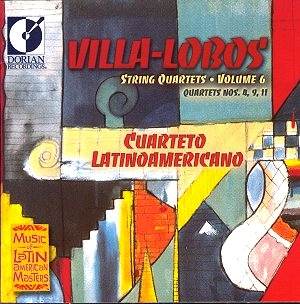Why wasnít I given the previous volumes to review?
This is the final volume and contains the finest of Villa Lobosís quartets.
His 17 quartets span the years 1915 to 1957 and the
composer took Haydn as his model. There is no better choice and yet
Villa Lobosí quartets are original using a personal style and a variety
of colour probably only equalled by Bartók, the greatest quartet
composer of them all.
I worry when people classify a composerís works into
periods and make something of it. We hear of Beethovenís early quartets,
his middle period quartets and his late quartets. Such definitions are
factious. Villa-Lobos has been labelled in the same way. We live in
days when we are told that Shostakovich has been rediscovered or , in
some cases, 'reconstructed', whatever that means! Is this not musicologists
trying to be important?
I adored the music of Shostakovich before I met him.
I am in a minority I know but I still think his 12th Symphony is a flawless
masterpiece! Do buy the Mravinsky performance.... it is one of the greatest
performances of any masterpiece!
But to return to Villa-Lobos. The Quartet no. 4 of
1917 is, in my view, his finest. It shows influences of his native Brazil.
The opening leisurely Allegro is full of melody and expression and beautifully
played here. The slow movement is very restful and very therapeutic
and quotes from his ballet Uirapuru. The scherzo is sheer delight full
of virtuosity and wit and also an innocence. The finale is in a classical
form. Its directness makes it even more endearing. It is incredible
to note that this quartet had to wait 30 years before its first performance.
The Quartet no. 9 of 1945 is very intense. The scherzo
is not a lightweight piece but highly complex. The slow movement is
beyond words. Musicologists will want to be nosy and find out why this
movement is so intense. But does it matter? The music is nothing short
of being ultra-classy. The complex finale is the work of a very clever
mind indeed.
The Quartet no. 11 is lighter and neo-classical in
style. It dates from 1948. I have heard all the arguments condemning
composers for being eclectic but it shows that a great composer is versatile.
It has elements of Brazil and ends with a tender slowish movement but
watch out for the virtuosity that precedes it!
As far as I can judge the performances are very good;
the sound is as well.
My apologies to our webmaster for submitting my latest
batch of reviews very late but it is his fault! He sends me such marvellous
repertoire that I listen and listen and the computer certainly does
not have the same interest!
Highly recommended.
David Wright

![]() Cuarteto Latinamericano
Cuarteto Latinamericano![]() DORIAN RECORDINGS DOR
93229 [79.23]
DORIAN RECORDINGS DOR
93229 [79.23]